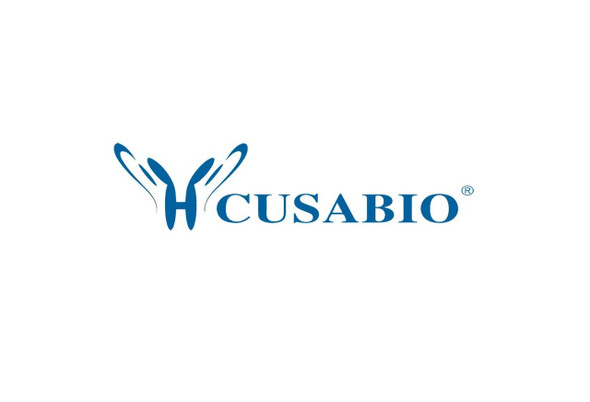Cusabio Mouse Recombinants
Recombinant Mouse Angiopoietin-2 (Angpt2), partial | CSB-RP169594m
- SKU:
- CSB-RP169594m
- Availability:
- 13 - 23 Working Days
Description
Recombinant Mouse Angiopoietin-2 (Angpt2), partial | CSB-RP169594m | Cusabio
Alternative Name(s): Angpt2; Agpt2Angiopoietin-2; ANG-2
Gene Names: Angpt2
Research Areas: Others
Organism: Mus musculus (Mouse)
AA Sequence: YSNFRKSVDSTGRRQYQVQNGPCSYTFLLPETDSCRSSSSPYMSNAVQRDAPLDYDDSVQRLQVLENILENNTQWLMKLENYIQDNMKKEMVEIQQNVVQNQTAVMIEIGTSLLNQTAAQTRKLTDVEAQVLNQTTRLELQLLQHSISTNKLEKQILDQTSEINKLQNKNSFLEQKVLDMEGKHSEQLQSMKEQKDELQVLVSKQSSVIDELEKKLVTATVNNSLLQKQQHDLMETVNSLLTMMSSPNSKSSVAIRKEEQTTFRDCAEIFKSGLTTSGIYTLTFPNSTEEIKAYCDMDVGGGGWTVIQHREDGSVDFQRTWKEYKEGFGSPLGEYWLGNEFVSQLTGQHRYVLKIQLKDWEGNEAHSLYDHFYLAGEESNYRIHLTGLTGTAGKISSISQPGSDFSTKDSDNDKCICKCSQMLSGGWWFDACGPSNLNGQYYPQKQNTNKFNGIKWYYWKGSGYS
Source: E.coli
Tag Info: N-terminal 6xHis-tagged
Expression Region: 19-483aa
Sequence Info: Partial
MW: 57 kDa
Purity: Greater than 90% as determined by SDS-PAGE.
Relevance: Binds to TEK/TIE2, competing for the ANGPT1 binding site, and modulating ANGPT1 signaling. Can induce tyrosine phosphorylation of TEK/TIE2 in the absence of ANGPT1. In the absence of angiogenic inducers, such as VEGF, ANGPT2-mediated loosening of cell-matrix contacts may induce endothelial cell apoptosis with consequent vascular regression. In concert with VEGF, it may facilitate endothelial cell migration and proliferation, thus serving as a permissive angiogenic signal .
Reference: Angiopoietin-2, a natural antagonist for Tie2 that disrupts in vivo angiogenesis.Maisonpierre P.C., Suri C., Jones P.F., Bartunkova S., Wiegand S.J., Radziejewski C., Compton D.L., McClain J., Aldrich T.H., Papadopoulos N., Daly T.J., Davis S., Sato T.N., Yancopoulos G.D.Science 277:55-60(1997)
Storage: The shelf life is related to many factors, storage state, buffer ingredients, storage temperature and the stability of the protein itself. Generally, the shelf life of liquid form is 6 months at -20?/-80?. The shelf life of lyophilized form is 12 months at -20?/-80?.
Notes: Repeated freezing and thawing is not recommended. Store working aliquots at 4? for up to one week.
Function: Binds to TEK/TIE2, competing for the ANGPT1 binding site, and modulating ANGPT1 signaling. Can induce tyrosine phosphorylation of TEK/TIE2 in the absence of ANGPT1. In the absence of angiogenic inducers, such as VEGF, ANGPT2-mediated loosening of cell-matrix contacts may induce endothelial cell apoptosis with consequent vascular regression. In concert with VEGF, it may facilitate endothelial cell migration and proliferation, thus serving as a permissive angiogenic signal (By similarity).
Involvement in disease:
Subcellular Location: Secreted
Protein Families:
Tissue Specificity: Expressed only at sites of vascular remodeling.
Paythway:
Form: Liquid or Lyophilized powder
Buffer: If the delivery form is liquid, the default storage buffer is Tris/PBS-based buffer, 5%-50% glycerol. If the delivery form is lyophilized powder, the buffer before lyophilization is Tris/PBS-based buffer, 6% Trehalose, pH 8.0.
Reconstitution: We recommend that this vial be briefly centrifuged prior to opening to bring the contents to the bottom. Please reconstitute protein in deionized sterile water to a concentration of 0.1-1.0 mg/mL.We recommend to add 5-50% of glycerol (final concentration) and aliquot for long-term storage at -20?/-80?. Our default final concentration of glycerol is 50%. Customers could use it as reference.
Uniprot ID: O35608
HGNC Database Link: N/A
UniGene Database Link: UniGene
KEGG Database Link: KEGG
STRING Database Link: STRING
OMIM Database Link: N/A









